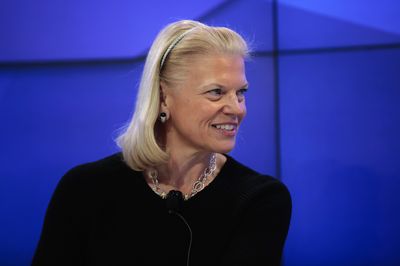Record of female attendees at World Economic Forum in Davos
Whether it was IBM boss Ginni Rometty, dashing onto the podium to anchor a panel on artificial intelligence, or a defiant Christine Lagarde, holding forth on the need to fight back against populism, high-powered women were everywhere at this year’s World Economic Forum (WEF) in Davos.
 AI at odds with typical female jobs
AI at odds with typical female jobs
What echoed through the halls of the main Congress Centre and after-hours events, though, was the sobering truth that the tenuous gains women have made in the world economy are at risk for those further down the ladder. Especially when it comes to the jobs of the future. The so-called Fourth Industrial Revolution, the rise of automation and artificial intelligence, is projected to be far more destructive globally to jobs currently favored by women than to jobs favored by men. Three of the top growth areas — management, computer and math, and architecture and engineering — have low female participation with little expectations of significant increases.
Societal bias in education
Overall female representation at the professional level and above in technology companies is expected to decline to 31 percent from 34 percent, according to a report by Mercer. Gender parity will take about 170 years, 52 years longer than estimated in 2015, at current rates, according to the WEF. Initially, colleges will aggressively recruit women to join their programs, he said. Therefore, there will be a shortage of computer science professors, so at some point, and consequently universities are forced to cap enrollment and decide who gets accepted to their programs. Women fare more poorly because they tend to be less prepared for the classwork, Roberts said. “We are not training women for the jobs of the future,” said Michael Roth, CEO of Interpublic Group, whose eight-year-old grandson is already learning to code. “There’s a huge opportunity in coding and we’re making a mistake if we don’t adjust our curriculum.” […]
read more – copyright by www.bloomberg.com


Record of female attendees at World Economic Forum in Davos
Whether it was IBM boss Ginni Rometty, dashing onto the podium to anchor a panel on artificial intelligence, or a defiant Christine Lagarde, holding forth on the need to fight back against populism, high-powered women were everywhere at this year’s World Economic Forum (WEF) in Davos.
What echoed through the halls of the main Congress Centre and after-hours events, though, was the sobering truth that the tenuous gains women have made in the world economy are at risk for those further down the ladder. Especially when it comes to the jobs of the future. The so-called Fourth Industrial Revolution, the rise of automation and artificial intelligence, is projected to be far more destructive globally to jobs currently favored by women than to jobs favored by men. Three of the top growth areas — management, computer and math, and architecture and engineering — have low female participation with little expectations of significant increases.
Societal bias in education
Overall female representation at the professional level and above in technology companies is expected to decline to 31 percent from 34 percent, according to a report by Mercer. Gender parity will take about 170 years, 52 years longer than estimated in 2015, at current rates, according to the WEF. Initially, colleges will aggressively recruit women to join their programs, he said. Therefore, there will be a shortage of computer science professors, so at some point, and consequently universities are forced to cap enrollment and decide who gets accepted to their programs. Women fare more poorly because they tend to be less prepared for the classwork, Roberts said. “We are not training women for the jobs of the future,” said Michael Roth, CEO of Interpublic Group, whose eight-year-old grandson is already learning to code. “There’s a huge opportunity in coding and we’re making a mistake if we don’t adjust our curriculum.” […]
read more – copyright by www.bloomberg.com
Share this: